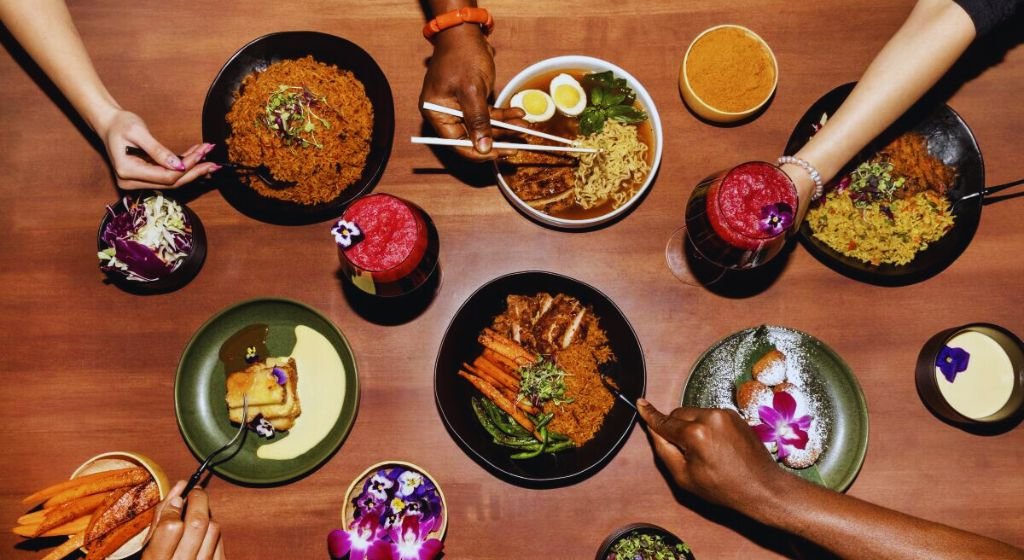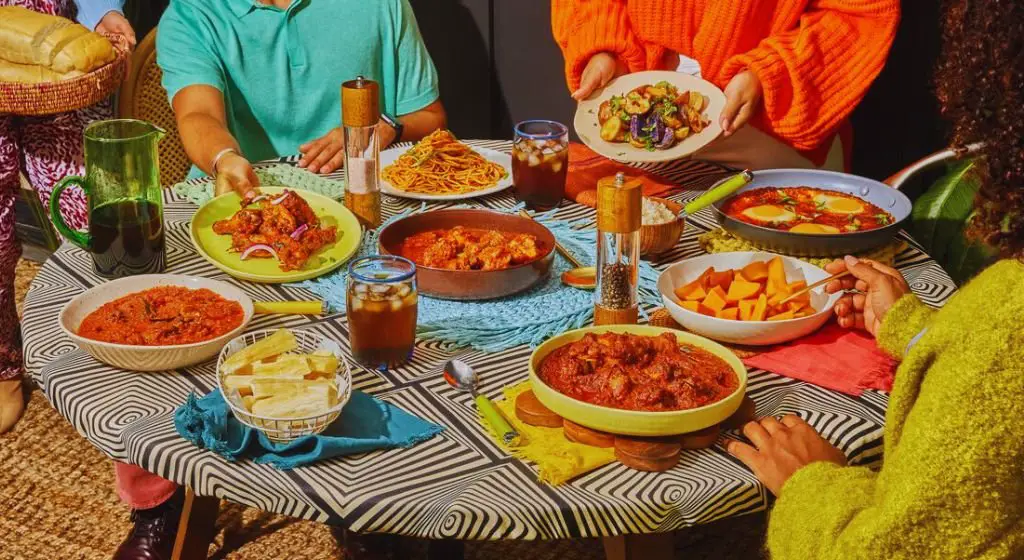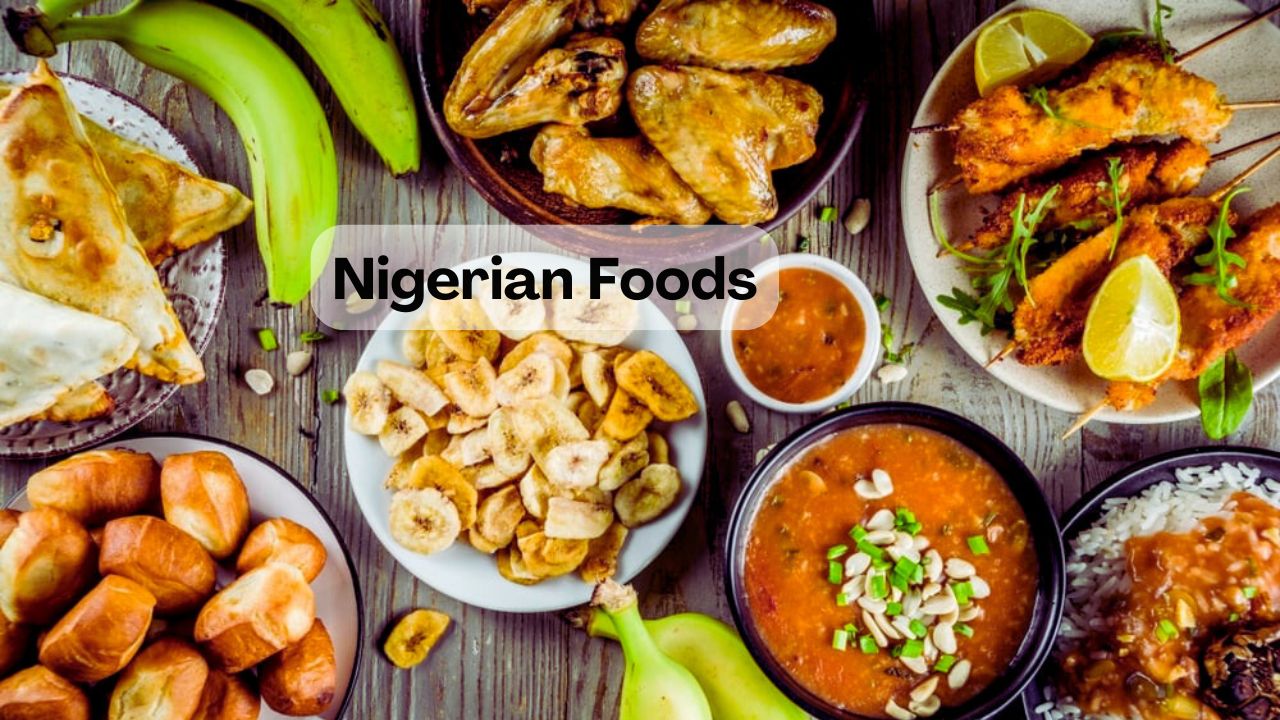Nigerian meals, much like different West African culinary traditions, are celebrated for his or her daring, spicy, and aromatic dishes. Whereas Jollof rice stands out as probably the most famend dish, the culinary depth of Nigeria extends far past, significantly with its number of intensely flavored soups and stews, together with an in depth number of “swallow” meals.
Nigerian meals, with its various ethnic teams and wealthy cultural heritage, presents a vibrant palette of flavors, components, and dishes that mirror the nation’s love for hearty, flavorful meals. From the bustling streets of Lagos to the serene landscapes of the Niger Delta, each area brings its distinctive style to the desk, making a culinary mosaic that’s as intriguing as it’s scrumptious. This text explores the essence of Nigerian meals, highlighting the standard dishes, cooking methods, and components that make Nigerian Meals a exceptional journey for the style buds.
What’s Nigerian Meals?
Nigerian Meals displays the various culinary traditions of its over 250 ethnic teams, sharing many options with neighboring West and Central African nations like Ghana, Benin, and Cameroon.
Staple meals reminiscent of yam, cassava, plantains, rice, and beans are central to the Nigerian food plan, usually accompanied by a wide range of wealthy soups and stews that includes meat and greens. Vegetable stews are a favourite, eaten steadily all through the week.
In Nigeria, the entire animal is utilized in cooking, minimizing waste. Favourite meats embrace beef, goat, rooster, and turkey, with frequent greens being Lagos spinach, water leaves, and pumpkin leaves.
Many Nigerian dishes generally use components like floor African crayfish, dry floor pepper, and Maggi cubes for flavoring, with palm and groundnut oil as well-liked cooking fat.
The Coronary heart of Nigerian Meals
On the core of Nigerian cooking is a deep appreciation for contemporary, domestically sourced components, starting from leafy greens and unique spices to all kinds of proteins together with beef, rooster, goat, and an abundance of seafood. Grains reminiscent of rice, maize, and millet, together with tubers like yams and cassava, kind the staple of many meals, offering a comforting base for the wealthy, spicy flavors that characterize Nigerian dishes.
Associated: Turkish Meals
How a Nigerian Meal Is Structured?
In Nigerian culinary custom, meals usually revolve round a single, substantial dish somewhat than a number of programs. Relying on the time, this might vary from akara or moin moin to a hearty mixture of rice, beans, and stewed greens.
A typical lunch at dwelling may characteristic rice and stew accompanied by fried plantains (dodo) and vegetable soup (efo), or maybe a soup wealthy with nuts, seeds, and greens served with a starchy aspect like eba or lafun, complemented by zobo or related drinks. At social gatherings, the meal may begin with an assortment of appetizers often known as “small chops,” reminiscent of puff puff, adopted by a primary course of jollof or fried rice, moin moin, and dodo.
These examples signify only a fraction of the huge array of Nigerian dishes which are celebrated and savored all through the nation. They provide a glimpse into the Nigerian eating expertise, showcasing the various flavors—from candy and salty to smoky, umami, and spicy—that Nigerian palates get pleasure from, illustrating the culinary variety from the North to the South and from the East to the West.
Signature Nigerian Dishes

Nigerian meals is a vibrant symphony of flavors and presents an array of signature dishes that embody the guts and soul of its wealthy tradition. From the smoky attract of Suya to the comforting embrace of Jollof Rice, every dish tells a narrative of custom, neighborhood, and culinary ingenuity, charming palates with a mix of candy, salty, smoky, umami, and spicy flavors.
Jollof Rice
No dialogue of Nigerian meals is full with out mentioning Jollof Rice. This beloved dish is a celebration of rice cooked in a tomato-based sauce, infused with spices and components like onions, garlic, and typically bell peppers, usually accompanied by items of fish, meat, or greens. Every area boasts its personal variation, making Jollof Rice a flexible and universally adored dish throughout Nigeria.
Pounded Yam and Egusi Soup
Pounded Yam, a clean, stretchy dough comprised of yams, serves as the right complement to Egusi Soup, a thick, hearty stew made with floor melon seeds, leafy greens, and meat or fish. This mixture is a testomony to the Nigerian knack for pairing textures and flavors to create fulfilling meals.
Suya
Suya, a preferred road meals, consists of spicy skewered meat, historically beef, rooster, or goat, marinated in a mix of spices and floor peanuts, then grilled to perfection. It’s a flavorful snack that captures the essence of Nigerian barbecue tradition.
Moi Moi
Moi Moi is a nutritious steamed bean pudding comprised of floor peeled beans, usually black-eyed peas, blended with peppers, onions, and an array of elective components like fish, eggs, or corned beef. It’s a flexible dish that may function a aspect or a primary course.
Pepper Soup
A light-weight, broth-based soup seasoned with a wide range of native spices and herbs, Pepper Soup can characteristic fish, rooster, goat, or beef. It’s identified for its intense warmth and is believed to have medicinal properties, usually serving as a treatment for colds and fever.
Learn Extra: Finest Eating places in Gatlinburg for Each Meals Lover
25 Most Fashionable Nigerian Meals
The wealthy tapestry of flavors that Nigerian Meals has to supply with our exploration of the 25 hottest Nigerian meals. From the smoky attract of Suya to the comforting heat of Jollof Rice, every dish presents a glimpse into the nation’s various culinary panorama, celebrating custom, taste, and communal pleasure. Indulge on this culinary journey that guarantees to enchant your style buds and deepen your appreciation for Nigeria’s vibrant meals tradition.
Jollof Rice
Jollof Rice is a beloved dish in Nigeria, consisting of long-grain rice cooked in a flavorful tomato sauce with onions, peppers, and a wide range of spices. It’s a celebration staple, usually served with rooster, beef, or fish, embodying the spirit of Nigerian festivities.
Pounded Yam and Egusi Soup
Pounded Yam, served with Egusi Soup, is a cherished mixture. The soup, comprised of floor melon seeds, greens, and meat, enhances the sleek, stretchy yam. This meal is a conventional delight, showcasing the wealthy textures of Nigerian Meals.
Suya
Suya, a preferred road snack, options thinly sliced meat marinated in spices and grilled. This spicy kebab is a favourite for its smoky taste and is often served with slices of onions and tomatoes, providing a fast style of Nigerian culinary experience.
Akara
Akara are deep-fried bean truffles comprised of blended black-eyed peas, onions, and spices. Loved as a breakfast merchandise or snack, these golden balls are a testomony to the simplicity and taste of Nigerian road meals.
Moi Moi
Moi Moi is a steamed bean pudding that highlights the flexibility of Nigerian meals. Constituted of pureed beans and flavored with peppers, onions, and fish or eggs, it’s a protein-rich dish usually loved as a aspect or primary meal.
Pepper Soup
Pepper Soup is a spicy, broth-based delicacy, seasoned with native herbs and spices, and might include fish, rooster, or goat. It’s famend for its medicinal properties, providing consolation and heat with each sip.
Ofada Rice and Ayamase
Ofada Rice, paired with Ayamase sauce, is a flavorful duo. The indigenous rice served with a spicy inexperienced pepper sauce, alongside assorted meats, captures the essence of native Nigerian flavors.
Efo Riro
Efo Riro, a spinach stew, is cooked with meat, fish, and a wealthy mixture of spices. This nutrient-packed stew is a staple in Nigerian properties, celebrated for its versatility and depth of taste.
Fufu
Fufu, a starchy accompaniment, is made by mashing yams, plantains, or cassava. It’s a basic a part of Nigerian meals, excellent for scooping up soups and stews.
Boli
Boli, or grilled plantain, is a straightforward but scrumptious road meals. Its smoky sweetness makes it a favourite snack or aspect dish, usually loved with groundnut or pepper sauce.
Okra Soup
Okra Soup, identified for its slimy texture, combines okra with meat and seafood, making a hearty and healthful dish. It’s broadly consumed throughout Nigeria, usually paired with fufu or rice.
Garri
Garri, a cassava-derived staple, is loved both as a chilly snack with sugar and water or used to make a thick dough for soups. Its versatility makes it an important a part of Nigerian meals tradition.
Ogbono Soup
Ogbono Soup options floor African mango seeds, creating a novel, mucilaginous texture. This wealthy soup is crammed with meat and greens, providing a particular style beloved by Nigerian households.
Nkwobi
Nkwobi is a tasty dish comprised of cow ft, cooked till tender and blended with a spicy palm oil sauce. It’s a preferred delicacy, particularly within the southeastern a part of Nigeria.
Amala and Abula
Amala, comprised of yam flour, is loved with Abula, a mix of Gbegiri (bean soup) and Ewedu (jute leaves). This wealthy, flavorful pairing is a testomony to Yoruba culinary custom.
Beans and Plantain
Beans and Plantain mix creamy cooked beans with candy, fried plantains. This nutritious and satisfying meal highlights the harmonious mix of flavors in Nigerian meals.
Afang Soup
Afang Soup, a vegetable soup from the Efik, is made with Afang leaves and waterleaf. Wealthy in meat and seafood, it’s a nutritious, flavorful dish that displays the culinary variety of Nigeria.
Banga Soup
Banga Soup, a palm nut soup, is a southern Nigerian specialty. Savory and wealthy, it’s usually served with starch or pounded yam, that includes meat or fish for a satisfying meal.
Tuwo Shinkafa
Tuwo Shinkafa, a rice pudding from northern Nigeria, is usually served with hearty soups like Miyan Kuka. Its clean, comforting texture makes it a favourite staple.
Dodo
Dodo, or fried ripe plantains, is cherished for its candy, caramelized edges. A flexible aspect dish, it enhances a wide range of Nigerian meals, including a contact of sweetness to savory dishes.
Asun
Asun is a tantalizing Nigerian delicacy comprised of spicy grilled goat meat that has been marinated in a wealthy mix of peppers and spices, after which grilled over an open flame to attain an ideal smoky style. This dish is usually served at events and gatherings, celebrated for its distinctive taste profile that mixes warmth from the spices with the succulence of the goat meat, making it a favourite amongst those that recognize daring, fragrant flavors.
READ: How Many Individuals Go to Quick Meals Eating places?
Deliver Conventional Nigerian Meals to your Desk

Nigeria is widely known for its vibrant historical past and dynamic culinary scene. For these trying to discover Nigerian flavors from the consolation of their very own kitchen, the next conventional Nigerian dishes function an ideal introduction:
- Jollof rice
- Tuwo shinkafa
- Fufu
- Afang soup
- Eba
- Efo riro
- Nkwobi
- Ogbono soup
- Suya
- Moin Moin
- Fried plantains
- Egusi soup
- Ewedu soup
For Nigerians residing abroad, Remitly presents a handy answer for remitting funds to household and associates again dwelling.
Learn Extra: AirFood Recipes
Elements that Outline Nigerian Cooking
The richness of Nigerian meals comes from its components. Spices like nutmeg, cinnamon, and native varieties reminiscent of Calabash nutmeg and African Negro pepper add depth to dishes. Palm oil, with its distinctive taste and pink coloration, is a staple in lots of recipes, whereas fermented locust beans (Iru) present a novel umami taste.
Nigerian Meals Cooking Strategies
Conventional Nigerian cooking includes a wide range of methods, from grilling (as seen in Suya) to frying, steaming (Moi Moi), and boiling. The preparation of soups and stews usually includes simmering components over low warmth to permit the flavors to meld fantastically, a course of that displays the Nigerian love for wealthy, deeply flavored dishes.
The Function of Meals in Nigerian Tradition
In Nigeria, meals is greater than sustenance; it’s a celebration of neighborhood and custom. Meals are sometimes shared, and cooking is taken into account an act of affection. Festivals and ceremonies are incomplete with out an abundance of meals, showcasing the central function delicacies performs in Nigerian social and cultural life.
Conclusion
Nigerian meals is a testomony to the nation’s wealthy cultural variety and culinary ingenuity. From the smoky flavors of Suya to the comforting heat of Pounded Yam and Egusi Soup, Nigerian dishes provide a journey by means of a world of flavors, textures, and aromas. This culinary custom, rooted in historical past and neighborhood, continues to evolve, inviting the world to discover and savor its wealthy tapestry of tastes.
Learn Additionally: French Foodie in Dublin Irish Meals Weblog Excursions and Occasions
Regularly Requested Questions (FAQs) about Nigerian Meals
Beneath you’ll find a couple of generally requested questions. Let’s examine them out.
What makes Nigerian meals distinctive?
Nigerian meals is understood for its daring flavors, in depth use of spices, and various dishes that mirror the nation’s wealthy cultural heritage. Its uniqueness comes from the mixture of fragrant spices, a wide range of proteins, and the standard “swallow” meals that accompany soups and stews.
Is all Nigerian meals spicy?
Whereas many Nigerian dishes are spicy because of the beneficiant use of chili peppers and spices, the delicacies presents a spread of flavors from delicate to highly regarded. The spice stage can usually be adjusted to go well with particular person tastes.
What’s a “swallow” meals in Nigerian delicacies?
“Swallow” refers to a bunch of starchy meals which are cooked after which pounded or kneaded right into a clean, dough-like consistency. They’re usually served as accompaniments to soups and stews and are eaten by pinching off a small piece and dipping it into the sauce.
Can I discover vegetarian choices in Nigerian delicacies?
Sure, Nigerian meals contains a number of vegetarian choices, particularly among the many soups and aspect dishes. Dishes like Moi Moi (steamed bean pudding), Akara (bean truffles), and varied vegetable stews and salads provide scrumptious vegetarian decisions.
What are some must-try Nigerian dishes?
Some must-try Nigerian dishes embrace Jollof Rice, Pounded Yam with Egusi Soup, Suya (spicy grilled meat), Ofada Rice with Ayamase sauce, and Moi Moi. These dishes present an excellent introduction to the flavors and textures of Nigerian delicacies.
How is Nigerian Jollof rice completely different from different sorts of Jollof rice?
Nigerian Jollof rice is understood for its distinctive seasoning and preparation methodology, which regularly contains cooking the rice in a flavorful tomato and pepper mix together with spices. Every West African nation has its personal model, however Nigerian Jollof is widely known for its wealthy style and the marginally smoky taste achieved by cooking it over firewood in some conventional settings.
Are there any Nigerian desserts or sweets?
Sure, Nigeria presents a wide range of desserts and sweets. Fashionable choices embrace Puff-Puff (deep-fried dough balls), Chin Chin (fried dough snacks), and Akara (candy bean truffles). Nigerian sweets usually incorporate native flavors like coconut, peanuts, and cassava.

